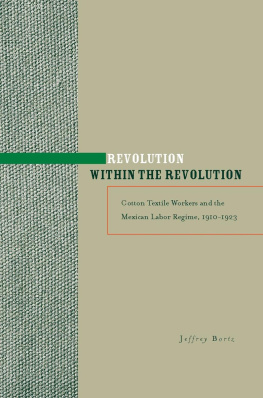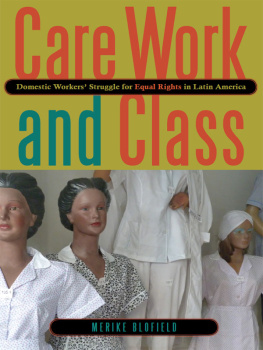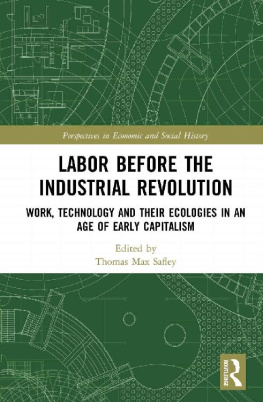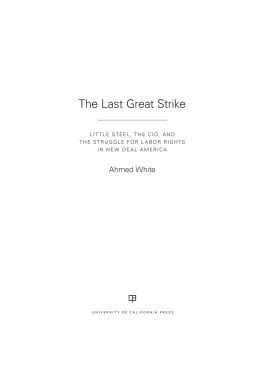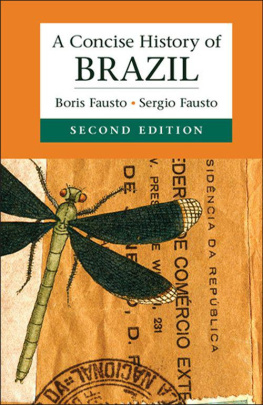Stanford University Press
Stanford, California
2011 by the Board of Trustees of the Leland Stanford Junior University. All rights reserved.
This book has been published with the assistance of the Croft Institute for International Studies and the Department of History at the University of Mississippi.
No part of this book may be reproduced or transmitted in any form or by any means, electronic or mechanical, including photocopying and recording, or in any information storage or retrieval system without the prior written permission of Stanford University Press.
Printed in the United States of America on acid-free, archival-quality paper
Library of Congress Cataloging-in-Publication Data
Dinius, Oliver J. (Oliver Jrgen)
Brazil's steel city : developmentalism, strategic power, and industrial relations in Volta Redonda, 19411964 / Oliver J. Dinius.
p. cm.
Includes bibliographical references and index.
ISBN 978-0-8047-7168-9 (cloth : alk. paper)
1. Iron and steel workersBrazilVolta RedondaHistory20th century. 2. Industrial relationsBrazilVolta RedondaHistory20th century. 3. Companhia Siderrgica NacionalHistory. I. Title.
HD 8039.I52B62 2010
331.7669142098153dc22
2010021475
Typeset by Bruce Lundquist in 10.5/12 Sabon
eISBN: 9780804775809
Acknowledgments
Many people and institutions lent support over the years that this book has been in the making. Work on this project has been at the heart of a journey that took me from my native Germany to Brazil for research and to the United States for an academic career. This tricontinental existence has mostly been exhilarating, but at times also exhausting, which has made me appreciate the unwavering support from my family, friends, and colleagues all the more. My thanks go to all those people and institutions that have helped me on that journey. Keeping track of all the wonderful people I have met on a more than decade-long journey can be a challenge, so let me apologize in advance to all those who would deserve mention but have been left out.
Numerous institutions provided generous support for research stays in Brazil. Most of the original archival work was completed in 199798 on a fellowship from the German Academic Exchange Service, partially funded by the Fundao Coordenao de Aperfeioamento de Pessoal de Nvel Superior (CAPES). Harvard University's Graduate School of Arts and Sciences provided a supplementary grant at a time when the currency stabilization program made Brazil a very expensive place to live. The David Rockefeller Center for Latin American Studies at Harvard University awarded me several summer research grants funded by the Tinker Foundation, the Mellon Foundation, and a gift by Jorge Paulo Lemann. The Alfred D. Chandler, Jr. Fellowship in Business History partially funded follow-up research. A Mellon Fellowship for Latin American History and a Harvard Graduate Society Fellowship provided much-needed teaching relief.
At the University of Mississippi, I have benefited from the generous support of the Office for Research and Sponsored Programs, which awarded me two faculty summer research grants. The College of Liberal Arts and the Croft Institute for International Studies each funded one summer research grant. The Department of History and the Croft Institute provided travel funds to several international conferences, giving me an opportunity to present my ongoing research. Both the director of the Croft Institute, Kees Gispen, and the chairman of the history department, Joe Ward, have been extremely supportive of my work, not least by agreeing to assume the cost of the subvention for the publication of this book.
Research in Brazilian archives remains in many respects an adventure that requires guidance from knowledgeable locals. The research in files of the political police at the Arquivo Pblico do Estado do Rio de Janeiro (APERJ) would have yielded incomparably less without the help of Leila Duarte and Paulo Roberto de Arajo, who kept their eyes open for pertinent documents in not-yet-catalogued fundos of the Acervo DOPS. Thanks also go to the helpful staff at the Arquivo Edgard Leuenroth at UNICAMP and at the Centro de Pesquisa e Documentao de Histria Contempornea do Brasil (CPDOC) in Rio de Janeiro. Many of the resident researchers at CPDOC generously shared their knowledge of the center's vast archive and of scholarly work not readily available in U.S. libraries. Carlos Marx at the Arquivo Nacional de Braslia deserves special gratitude for making arrangements that allowed me to work my way through hundreds of boxes of largely uncatalogued documents from the Ministry of Labor in a very short window of time.
Research at the Companhia Siderrgica Nacional would not have been feasible without the generous support of Jos Vieira and Wladimir at the Central Archive, Delgado at the personnel archives, Marlene at the library, Alessandra at the photographic archive, and Z Augusto in the industrial relations department. They made me feel welcome in a corporate environment, facilitated my research in an eclectic set of uncatalogued sources, and gave me the freedom to discover sources that they were not aware of themselves. I would not have been able to master the processing of large quantities of data from those sources without the excellent work of my local research assistant, Thamara Santos de Oliveira. Marcos Queiroga Barreto and Marina Castro de Abreu, at the CSN headquarters in So Paulo, walked me through the process of getting the authorization to use company photographs and responded speedily to requests for specific permissions. I relied on the generous help of Helton Fraga, Jos Vieira, and Solange Whehaibe in Volta Redonda to produce the high-definition scans required for publication. Special thanks go to Wilson Menegale at USINA GRFICA, who scanned the photos on short notice at no charge.
My understanding of work and technology in modern steel mills owes much to conversations with retired workers and engineers in Volta Redonda. I am most grateful for the time they took to share their knowledge and memories. The engineer Elmo Coutinho deserves special praise for his willingness to field my often rather ignorant questions about steel mill technology. It is always a joy to return to his home for wide-ranging intellectual conversations. Several of the others I interviewedAllan Cruz, Ervin Michelstaedter, and Waldyr Bedhave since passed away, and I hope that this book will help to keep their memory alive.
I had the good fortune that Rosalice Fernandes adopted me during my first visit to Volta Redonda and hosted me for subsequent research stays, including several months in 1998 when her house also served as headquarters for her campaign to be elected state representative. The stimulating conversations with Rosalice, Joo Pedro, Bartolomeu, and Isaque about the latest wrinkle in the trabalhista politics of the Sul Fluminense remain some of my fondest memories of my research year in Brazil. Fausto Ferreira and Solange Whehaibe hosted me during follow-up trips to Volta Redonda and put me in touch with voltaredondenses who had stories to tell about the old days. Solange and her husband Paulo always welcomed me for a bate papo at their bookstore, the Livraria Veredas, or at their home.
For our good times in Campinas, So Paulo, and Rio de Janeiro


